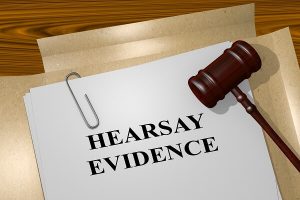Published in Criminal Law by Chris Eskew on October 12, 2016.

In the legal context, hearsay means an out of court statement, offered in court, to prove the truth of the matter asserted. Hearsay evidence is testimony or documents quoting people who are not present in court. It is a form of second-hand testimony, and it is generally inadmissible at trial to prove a particular fact. This is known as the “Hearsay Rule” under the court’s rules of evidence.
Why is hearsay inadmissible?
Hearsay evidence is generally inadmissible because the testimony does not come from a firsthand witness. When the person quoted is not present, establishing the credibility of that person becomes impossible because the opposing attorney is unable to cross-examine the person who is not present. There is no way to verify whether what the absent person said is truthful, or whether that person is credible.
For example, let’s say that Adam is on trial for committing a crime. A witness, Bob, attempts to testify in court that another eyewitness, Charles, told Bob that he saw Adam commit the crime. Because Charles is not himself testifying, there is no way for Adam’s attorney to ask Charles whether what he saw was accurate, or ask Charles questions to determine whether he is trustworthy. Therefore, Bob’s testimony about what Charles told him will not be allowed to prove that Adam committed the crime.
Exceptions to the Hearsay Rule
Under certain circumstances, out of court statements will be allowed in as evidence at trial even though they are hearsay. In these instances, a judge will overrule an objection based on hearsay. Under Indiana law, there are 23 exceptions to the Hearsay Rule. These are a few of the common exceptions to the Hearsay Rule that will allow the testimony or documents to be admissible at trial:
- Excited Utterance – An excited utterance is a statement made during or immediately following a criminal act that is typically made on impulse. The rationale behind this exception is that during or after a criminal act “in the heat of the moment,” a person is not likely to have the presence of mind to lie or give false statements, making the possibility of fabrication less likely.
- Statement Against Interest – A statement against interest, sometimes referred to as an admission or confession, is a statement or action which in some way adversely affects the person making the statement. The confession does not need to be a formal admission, such a statement given to police. These statements are often made in private settings to someone the person confides in. The theory behind this exception is that a person would not fabricate a statement that goes against his or her best interest, i.e. would get them into trouble in some way. Whether the witness testifying about the statement is being truthful is a matter of credibility, but not admissibility.
- Business and Public Records – Any properly kept official government records are admissible, such as income tax returns and employment information. Private business records are also admissible, so long as they can be identified by a qualified witness who can also explain how they were maintained or clarify their meaning. Prior court decisions or documents may also be admissible, even when they reference witness statements of people who are not present.
- Prior Testimony – Testimony given at a previous court proceeding or deposition may be admissible even if that person is not present at the current proceeding. If the person who made the original statement made it under oath, and the parties had the chance to cross-examine the person at the time, the statement may be admitted even though it is hearsay. This rule is often used to introduce testimony given at a deposition.
The Hearsay Rule and its exceptions are very technical and require an experienced attorney to fully understand their application. An experienced attorney will know what evidence is admissible to help your case, as well as when to object to evidence that opposing counsel may attempt to offer at trial. The attorneys at Eskew Law can help you navigate through the hearsay rules and exceptions, as well as all of the other complex evidence rules.
